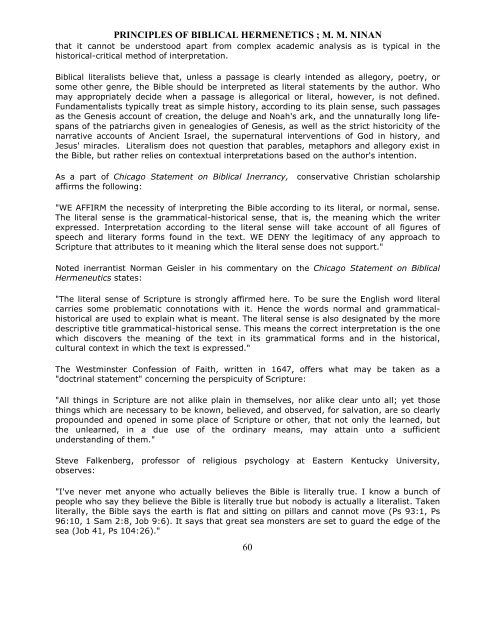Biblical Hermeneutics
Create successful ePaper yourself
Turn your PDF publications into a flip-book with our unique Google optimized e-Paper software.
PRINCIPLES OF BIBLICAL HERMENETICS ; M. M. NINAN<br />
that it cannot be understood apart from complex academic analysis as is typical in the<br />
historical-critical method of interpretation.<br />
<strong>Biblical</strong> literalists believe that, unless a passage is clearly intended as allegory, poetry, or<br />
some other genre, the Bible should be interpreted as literal statements by the author. Who<br />
may appropriately decide when a passage is allegorical or literal, however, is not defined.<br />
Fundamentalists typically treat as simple history, according to its plain sense, such passages<br />
as the Genesis account of creation, the deluge and Noah's ark, and the unnaturally long lifespans<br />
of the patriarchs given in genealogies of Genesis, as well as the strict historicity of the<br />
narrative accounts of Ancient Israel, the supernatural interventions of God in history, and<br />
Jesus' miracles. Literalism does not question that parables, metaphors and allegory exist in<br />
the Bible, but rather relies on contextual interpretations based on the author's intention.<br />
As a part of Chicago Statement on <strong>Biblical</strong> Inerrancy, conservative Christian scholarship<br />
affirms the following:<br />
"WE AFFIRM the necessity of interpreting the Bible according to its literal, or normal, sense.<br />
The literal sense is the grammatical-historical sense, that is, the meaning which the writer<br />
expressed. Interpretation according to the literal sense will take account of all figures of<br />
speech and literary forms found in the text. WE DENY the legitimacy of any approach to<br />
Scripture that attributes to it meaning which the literal sense does not support."<br />
Noted inerrantist Norman Geisler in his commentary on the Chicago Statement on <strong>Biblical</strong><br />
<strong>Hermeneutics</strong> states:<br />
"The literal sense of Scripture is strongly affirmed here. To be sure the English word literal<br />
carries some problematic connotations with it. Hence the words normal and grammaticalhistorical<br />
are used to explain what is meant. The literal sense is also designated by the more<br />
descriptive title grammatical-historical sense. This means the correct interpretation is the one<br />
which discovers the meaning of the text in its grammatical forms and in the historical,<br />
cultural context in which the text is expressed."<br />
The Westminster Confession of Faith, written in 1647, offers what may be taken as a<br />
"doctrinal statement" concerning the perspicuity of Scripture:<br />
"All things in Scripture are not alike plain in themselves, nor alike clear unto all; yet those<br />
things which are necessary to be known, believed, and observed, for salvation, are so clearly<br />
propounded and opened in some place of Scripture or other, that not only the learned, but<br />
the unlearned, in a due use of the ordinary means, may attain unto a sufficient<br />
understanding of them."<br />
Steve Falkenberg, professor of religious psychology at Eastern Kentucky University,<br />
observes:<br />
"I've never met anyone who actually believes the Bible is literally true. I know a bunch of<br />
people who say they believe the Bible is literally true but nobody is actually a literalist. Taken<br />
literally, the Bible says the earth is flat and sitting on pillars and cannot move (Ps 93:1, Ps<br />
96:10, 1 Sam 2:8, Job 9:6). It says that great sea monsters are set to guard the edge of the<br />
sea (Job 41, Ps 104:26)."<br />
60


















